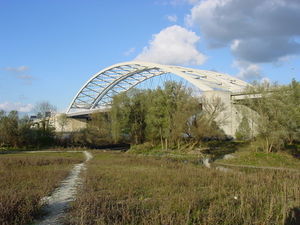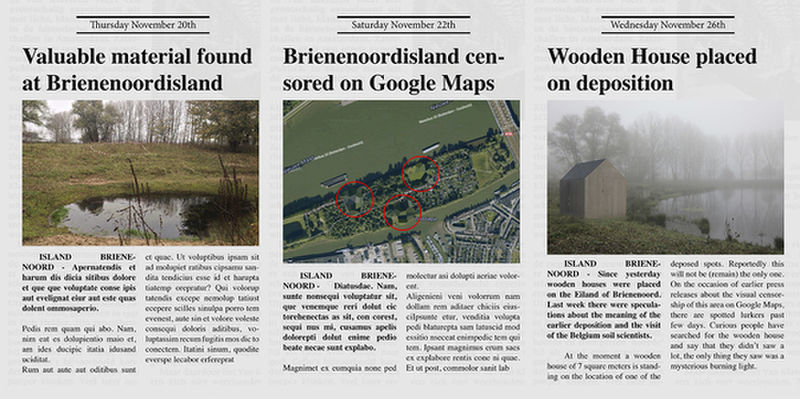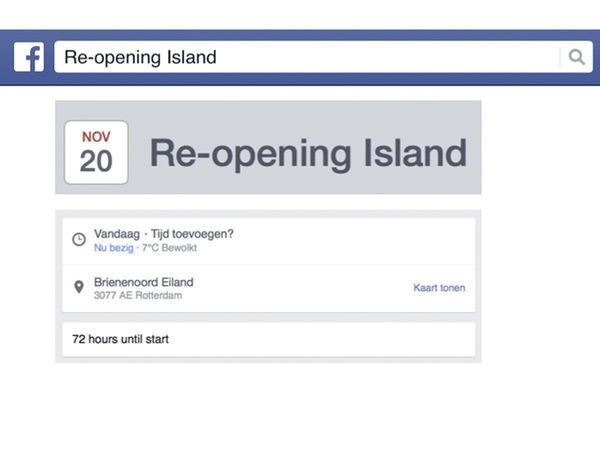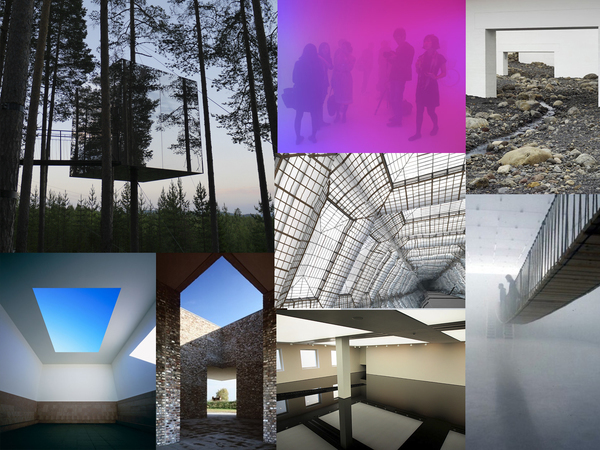Eiland van Brienenoord
Contents
THE CIVIC ECONOMY MASTERCLASS
Hosted and guided by Isaac Monté (Sweatshop Deluxe) and Maurice Specht (De Makers van Rotterdam)Organised by Jessica Bergmann (Pink Pony Express)Location: Clubhouse “De Arend en de Zeemeeuw”[1], Eiland Van Brienenoord 5 (Van Brienenoord Island[2]), Rotterdam.
In many cities, we are increasingly witnessing the emergence of new forms of ownership: the consumer society is turning into a civic economy. In recent years in Rotterdam, a number of social initiatives and subsidy-free enterprises have been founded, such as Hotspot Hutspot, [Leeszaal West] and [Sweatshop Deluxe]. What are the possibilities offered by these new initiatives for the development of new business models?
A public ‘free haven’ for the civic economy Citizens’ collectives are expected to more or less independently tackle social challenges. Often this work is done by people who just happened to be there. They do the best they can, which is often enough. But where can they go to develop their competences and insights? What kind of infrastructure would it take to help them? In this master class, you will be developing a free haven for ‘makers’ and ‘doers’. The focus is on solving social issues through social, cultural and artistic interventions.
De Makers van Rotterdam[3] and Sandersgeluk are currently managing the clubhouse ‘De Arend en de Zeemeeuw’ on Van Brienenoord Island. They plan to use this location for their offices, and more importantly as a public ‘free haven’ with a tremendous potential: a place where the powers of social and cultural imagination are brought together. This location will serve as our real-world case, as well as the work location for this master class. The managers of the clubhouse will be your hosts and guest experts. They are still in the early stages of this process, therefore the questions they will be proposing are still broad and general. They are looking for people with imagination: that’s you. The question they are asking is: how do you picture the ideal ‘free haven’, where the civic economy can be developed? And what are the relevant creative business models?
The clubhouse ‘De Arend en de Zeemeeuw’ on the romantic Van Brienenoord Island will become your inspiring work environment for one week.
Additional information:
De Makers van Rotterdam sees it as its mission to identify and strengthen social entrepreneurship in Rotterdam, and to stimulate discussion on the subject. The team consists of a philosopher, a public administrator and a cultural programmer.
Makerscollectief Sandersgeluk[4] puts together social projects in the broadest sense of the term, and consists of a theatre producer, a visual artist and the same cultural programmer mentioned above.
Sweatshop Deluxe[5] is a Rotterdam-based design label with its own production workshops. The label provides young designers with an opportunity to manufacture their designs. Sweatshop Deluxe stands for Design with a capital D, manufactured according to social principles. Each Sweatshop Deluxe product is unique: hand-made, in limited editions, and designed by promising young designers. The products are manufactured by people who are otherwise unable, for a variety of reasons, to participate in the regular labour market. Sweatshop Deluxe uses wherever possible sustainable or recycled materials.
A lot of contemporary companies and organizations suffer from tunnel-vision and try to solve problems, using old methods. These proud companies and organizations would be better of if they’d just admit, that they are facing some problems they can’t solve; So that new collaborations can arise in order to search for new methods to tackle these obstacles; If there’s room for doubt, there’s room for creativity, coming from all kinds of disciplines.
Assignment
Maurice Specht has received a key to the Island van Brienenoord; A place where you can escape from the city life, with a view of the city. Think of a new purpose for this island, without damaging it. In order to do so, reflect on modern day society; Create a haven for thinkers, doers and dreamers.
Concept
Within our society there’s no room for doubt; You’re expected to make convincing decisions. And if you don’t, you’re considered weak. Think about how we judge politicians, scientists and business people.
It's a pity, because we all have these moments when we just don’t know. When there’s room for doubt, there’s room for experimentation. And from this experimentation there arise new insights. Also by showing your doubts, you allow different disciplines and their methods; Together you can try new approaches towards solving the problem.
The year of doubt
Within this year there are three steps:
Step 1: Press releases
We want to reach a broad target group containing business people, creatives, politicians, craftsmen and scientists. Our goal is to get these people together on the island, in order to share their knowledge with each other using doubt as a means.
Using the mystery and unfamiliarity of the island, we want to create a hype; By creating an urban-myth, we want to make people curious and allow them to give their own interpretation of what’s going on. We spread three press releases: The first one’s about new valuable material being found on the island, which metaphorically refers to discovering the value of doubt. The next two are also about activity and discovery, which make the mystery more convincing and therefore make the reader even more curious.
Step 2: Kick-off
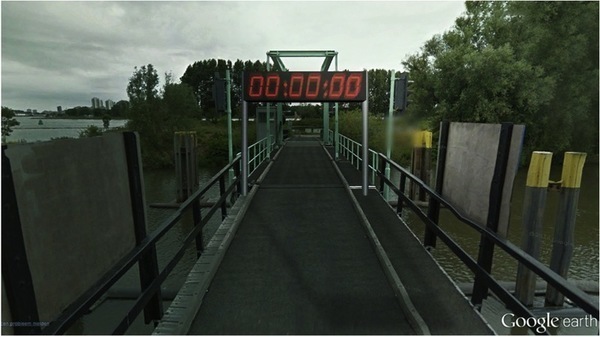
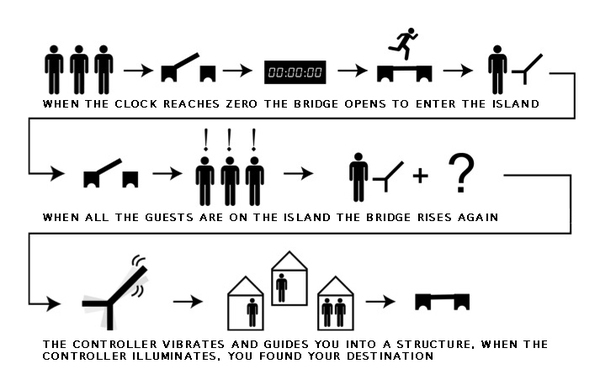
Time’s ticking away slowly. When the clock reaches “00:00:00”, the bridge will opens and the participants can enter the island. Once the’ve all entered, the bridge rises again, so that no one can leave the island.
The game begins! At the beginning each participant can obtain a controller. The controller will ask you several questions about the island; Once you gave an answer to all these questions the controller will lead you to a place on the island by using vibrations. When the controller lights up, you’ve reached your goal. Here you will meet other participants.
Different structures were built on the island as a metaphor for different kinds of doubts. Physical dynamic structures that changes form to accommodate different kinds of doubt.
Step 3: program
Within this year of doubt, we will look at doubts that we think are or should be important;
Economy
We’ve all experienced what the consequences of not doubting within economics have caused our society. Together with economic experts we question modern day economics, to obtain new insights;
Themes could be: value, sharing, scarcity and income inequality.
Ecology
The van Brienenoord-eiland’s nature might be beautiful, but it’s also very much disturbed by the city’s industry; the ground looks grayish, the ponds have minimal current, the flora isn’t very vital and you can see it’s soil is polluted because of the many blackberry-bushes trying to heal it.
There’s no doubt our society has environmental issues; Is there for example a way we can cleanse this island and also win insights how to change our society’s ecology? Can we use the eco-systems that are present on this island to do so? Or do we need elements from outside the island?
Together with van Brienenoord-eiland’s own forester and various ecologists we will rethink the ecology of our society.
Relations
When you think about doubt in relation to relationships, you ought to think there’s something wrong. But because of it’s reflective function, doubt can be very powerful within this context; And in order for relationships to grow and strengthen, you will very much need it.
Expressing your doubts within any kind of relation can be hard, it can result in very emotional situations. Can accepting doubt make expressing and receiving doubts more bearable?
Science
There’s been a lot of scientific research by different scientists on similar subjects, with different outcomes. This makes us non-scientists who expect science to be the truth doubt if it is. Is this expectation always realistic?
There’s no doubt scientists strive for certainty and answers, but the road towards it must be full of doubt. We think scientists and non-scientist should get together and doubt about what science is and what to expect from it.
Business Model
In order to develop towards an autonomous think-, make- and workplace for and about the future of the city; We need a business plan. As guidelines for this future plan, we had te following ideas:
- Extreme cost-reduction: No alarm, no insurance, no electricity, etc.
- For the exploitation budget, not to be dependent on external funders. We can make profit from renting the location to external parties
- The office can be ran by a limited amount of people
- “Artist/writer/thinker in residence”-program: in exchange for rent these people can work/live on the island
- For the cultural an substantive program we will request cultural subsidies and/or fundings
- Develop our own products, that create a modest amount of money
- To function as a breeding place for new civic entrepreneurs; The start-ups have a lasting investment in the island
- Summer-weekends with catering
The Highline, New York
Doubters inc.[6]
Doubters incorporated geeft een podium aan twijfelaars.
- Carli Schenkeveld
- Otske Pennin
- Gabriëlla Meijer
- Kai Chung Ip
- Lou Muuse
- Jessica Hammarlund Bergmann
- Maurice Specht
- Wessel van den Berge
- Dennis Wuisman
- Maarten van Blokland
- Isaac Monté
- Liza Koch
- Natascha Goed
- Tabo Goudswaard
- Sabrina Lindemann
- Miek Walda
- Hanako Lodder
